Module pages
Module pages
Download the Adult's Personal File for Section Leaders
Download the Adult's Personal File for Section LeadersThe module pages set out for each module:
The aim and topics for each module explain the content of the module some questions to help you to check your knowledge and review it with your Training Adviser state the learning methods for each module provide validation criteria for each module and suggest potential evidence for validation.
Check Your Knowledge
These questions are designed to help you establish what you already know and the learning you still have to complete for this module. You should work with your Training Adviser to identify any learning you have left to complete and how you can complete this. These questions will explore your knowledge on the topics covered; you will need to demonstrate practical experience to meet the requirements of the validation criteria below.
Validation Criteria
The validation criteria for each module are shown in the following pages. For some modules, the specified criteria must be completed by all roles; in some other cases however, there are validation criteria that apply to all roles and other that are only relevant to certain roles. If you're not sure about what criteria apply to your role, please discuss this with your Training Adviser. In some instances, it will also depend on the learner’s agreed role description whether certain criteria apply.
Change of Role
The module pages below state when revalidation of a module is required when a learner changes role within Scouting.
Personal Learning Plan (02)
To develop a Personal Learning Plan to allow you to complete the training requirements for your role, taking into account existing knowledge and skills.
Creation of a Personal Learning Plan which:
- Identifies the modules relevant to your role
- Assesses if you have to complete learning for this module
- Specifies how this learning will be accessed
- Provides validation ideas
- Provides a time frame for completing your training
Revalidation of this module is required for any change of role
These questions are designed to help you establish what you already know and the learning you still have to complete for this module. You should work with your Training Adviser (TA) to identify any learning you have left to complete and how you can complete this. These questions will explore your knowledge on the topics covered; you will need to demonstrate practical experience to meet the requirements of the validation criteria below.
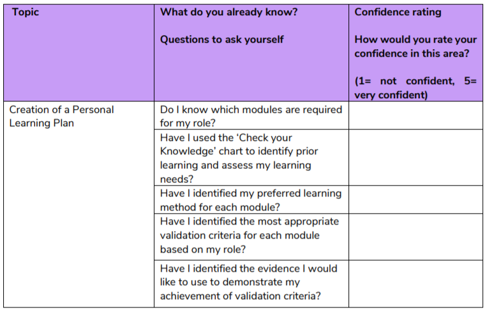
One to One
To validate this module, you will need to:
Create and agree a Personal Learning Plan with your Training Adviser to allow you to complete the training requirements for your role, taking into account existing knowledge and skills.
Evidence you could use may include one or more of the following: completed Personal Learning Plan Document, discussion with your Training Adviser focussing on how you will complete the training requirements of your role.
The list of evidence provided for each validation criteria is not exhaustive and there may be other forms of evidence that you may wish to use to validate this module. These can be agreed with your Training Adviser. In addition to looking at the evidence you have provided, your Training Adviser will ask you to review and explain some elements, to ensure that you have applied your knowledge and understanding in your role.
Essential Information (01)
To provide all adults in Scouting with the essential information needed to get started in their role
By doing this training you will:
- Understand the basics of Scouts’ volunteer training scheme
- Learn about our movement’s history
- Explore the fundamentals of Scouts and how to bring them to life.
- Understand the importance of the Safety and Safeguarding policies in keeping people safe while in the Scouts.
- Learn about our structure, and find out where you fit within Scouts and the support that’s available
- Understand the Equal Opportunities policy, and how to make sure every member feels included and able to fully participate in Scouts.
Revalidation of this module is not required for any change in role.
eLearning
To validate the Module, you will need to:
Complete the assessment at the end of the eLearning module, this will generate a certificate, the
certificate is the validation needed for this training module.
Safety
To provide all adults in Scouting with an understanding of safety practice and responsibilities as a member of Scouts, to keep everyone safe.
By doing the e-learning you will:
- Understand the Safety Policy and your responsibilities for keeping young people and adults in our movement safe
- Be able to demonstrate how to assess and manage risk
- Understand the role of the leader in charge
- Know what to do in an emergency, and how to report incidents and near misses
- Know where to access safety
Revalidation of this module is not required for any change in role. It is though required to be renewed every three years.
eLearning
To validate the Module, you will need to:
Complete the assessment at the end of the eLearning module, this will generate a certificate, the certificate is the validation needed for this training module.
Safeguarding
To provide all adults in Scouting with an understanding of safeguarding practice and responsibilities as a member of Scouts, to keep everyone safe.
By doing this workbook you will:
- Understand the Safeguarding Policy and your responsibilities for keeping our young people, and adults at risk, safe
- Understand the Young People First Safeguarding Card Code of Conduct (Yellow Card)
- Know how to recognise abuse
- Know how to report concerns
- Know what to do to make Scouts safe
Revalidation of this module is not required for any change in role. It is though required to be renewed every three years.
eLearning
To validate the Module, you will need to:
Complete the assessment at the end of the eLearning module, this will generate a certificate, the certificate is the validation needed for this training module.
Trustee Introduction
To provide the Charity or managing Trustees with information on their legal responsibilities and current regulations.
By doing this training you will:
- Understand the Trustee Boards and trusteeship in Scouts
- Understand Scouts’ key policies
- Understand the roles and responsibilities of trustees in Scouts
Revalidation of this module is not required for any change in role.
eLearning
To validate the Module, you will need to:
Complete the assessment at the end of the eLearning module, this will generate a certificate, the certificate is the validation needed for this training module.
General Data Protection
Regulations (GDPR)
To provide all adults in Scouting with an understanding of what the General Data Protection Regulations (GDPR) means for them, their Scout Group, District and County and how to effectively align with it
- Personal Data
- Individuals’ rights
- Consent
- Accountability & Governance
Revalidation of this module is not required for a change of role
These questions follow the topics covered in the e-learning for this module. You should work with your Training Adviser (TA) to identify any learning you have left to complete and how you can complete this.
These questions will explore your knowledge on the topics covered when you validate the module with your TA.
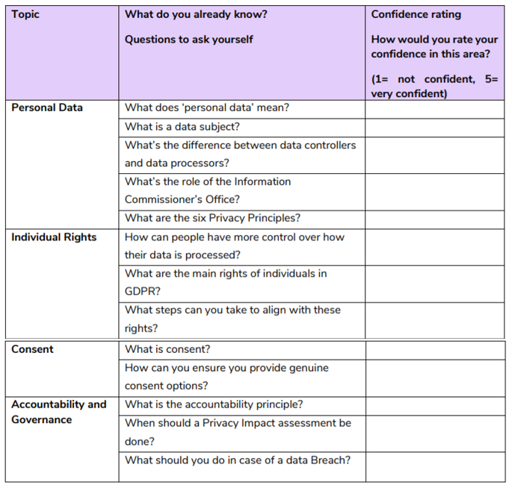
e-learning
To validate the Module, you will need to:
Complete the check your knowledge section at the end of the eLearning module, this will generate a certificate, the certificate is the validation needed for this training module.
Tools for the Role (Section
Leaders) (03)
To provide Section Leaders and section supporters with basic information on the section they support, their role and area of responsibility, along with some practical help to get individuals started in their role.
- Main features of the section they support and how it fits into Scouting
- The roles and responsibilities of different people within their section
- The use of a variety of programme ideas through different types of activities
- Youth shaped Scouting
- Promoting positive behaviour in their section
Revalidation of this module is required when changing sections
These questions are designed to help you establish what you already know and the learning you still have left to complete for this module. You should work with your Training Adviser (TA) to identify any learning you have left to complete and how you can complete this. These questions will explore your knowledge on the topics covered; you will need to demonstrate practical experience to meet the requirements of the validation criteria below.
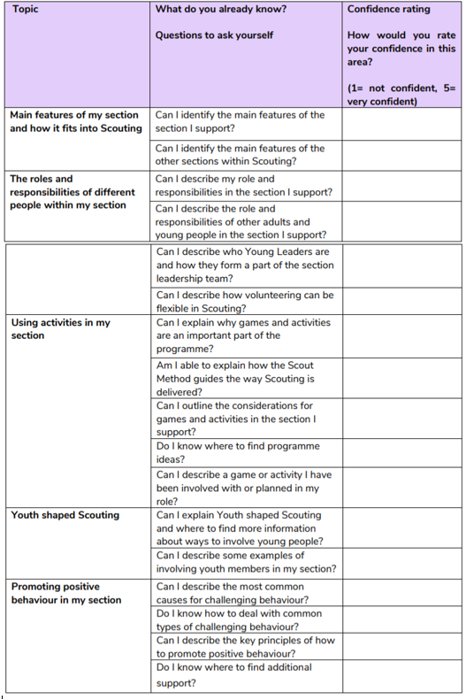
- Course
- One to One
- Small group
- e-learning
To validate this module, you will need to complete one of the following:
Plan and run, or assist in running, a section meeting; and reflect on this in a discussion with your Training Adviser.
You should include:
- One activity or game appropriate to the section
- One ceremony appropriate to the section
Remember to consider:
- How the section leadership team will work together to deliver the meeting
- The key ceremonies for the section
- The key features of the section
- Why different games and activities are an important part of the programme
- Important considerations for activities and games in Scouting
- Sources of relevant programme ideas
- How to include the young people’s thoughts and ideas
- Ways to promote good behaviour throughout the meeting
Evidence you could use to validate this module may include one or more of the following: a visit from your Training Adviser, a written or verbal statement to your Training Adviser from an observer summarising your role in a section meeting, Programme plans you have developed or assisted in the development of including information on activities, games, ceremonies or section meetings that you have run, instructions for running a game, activity or ceremony for your section including instructions for various members of the leadership team, photos/videos of you running activities, games or ceremonies or section meetings, discussion of evidence of activities, games, ceremonies or section meetings that you have run (this should focus on how you incorporated the elements listed into the section meeting and be accompanied by another form of evidence).
Any other ideas subject to agreement with your Training Adviser.
Additional validation criteria can be created in consultation with a Training Adviser if necessary. Any additional validation criteria created will need to check what you have learnt and that you can apply the skills that you have acquired to your role.
The list of evidence provided for each validation criteria is not exhaustive and there may be other forms of evidence that the learner may wish to use to validate this module. These can be agreed between you and the Learner. In addition to looking at the evidence the learner provides, you will need to review and prompt them to explain some elements of the evidence in order to ensure that they have applied their knowledge and understanding in their role.
NB Please note some examples of validation criteria will not be relevant for member who have been
Young Leaders. Please discuss with your TA what alternative activities could be used for validation.
Delivering a Quality Programme (12A)
To provide Leaders, Managers and Supporters with information about how we deliver Scouting to young people and young adults, and how we ensure it meets their needs.
- Key elements of the programme for each section
- Badges and Awards
- Reviewing the programme
- The Young Leaders’ Scheme
- Youth Shaped Scouting
Partial Revalidation of this module is required when moving to a Manager or Supporter appointment; in which case learners must complete one of the manager specific validation criteria in light of their new role.
These questions are designed to help you establish what you already know and the learning you still have left to complete for this module. You should work with your Training Adviser (TA) to identify any learning you have left to complete and how you can complete this. These questions will explore your knowledge on the topics covered; you will need to demonstrate practical experience to meet the requirements of the validation criteria below.
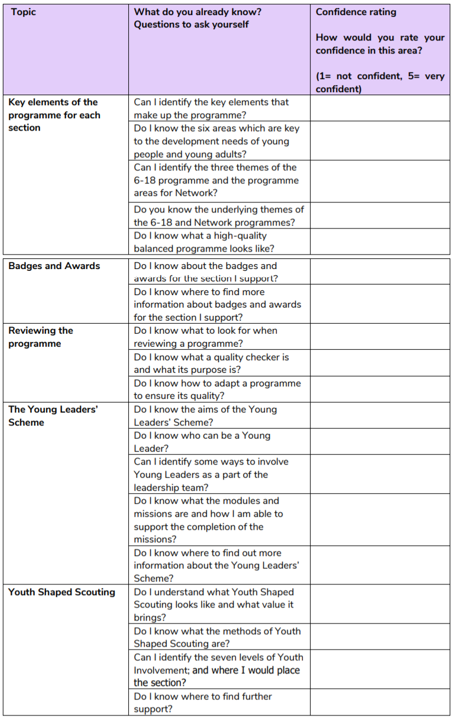
- Course
- One to one
- Small Group
- e-learning
To validate this module, you will need to complete the following:
- Discuss your responses to the questions in the Check your Knowledge chart with your Training Adviser
- Any other ideas subject to agreement with your Training Adviser.
Additional validation criteria can be created in consultation with a Training Adviser if necessary. Any additional validation criteria created will need to check what you have learnt and that you can apply the skills that you have acquired to your role.
The list of evidence provided for each validation criteria is not exhaustive and there may be other forms of evidence that you may wish to use to validate this module. These can be agreed with your Training Adviser. In addition to looking at the evidence, you have provided, your Training Adviser will ask you to review and explain some elements in order to ensure that you have applied your knowledge and understanding in your role.
Section Leaders
Section Leaders are also required to complete Programme Planning (12B)
The Fundamentals of Scouting (05)
To explore the Fundamentals of Scouting and the Religious Policy and consider their relationship with the high-quality balanced programme delivered to young people.
- The Values of Scouting in the high-quality balanced programme
- Using the Scout Method with young people
- Embedding spiritual development within the high-quality balanced programme
- The Scouts’ Religious Policy
Revalidation of this module is not required for any change of role
These questions are designed to help you establish what you already know and the learning you still have left to complete for this module. You should work with your Training Adviser (TA) to identify any learning you have left to complete and how you can complete this. These questions will explore your knowledge on the topics covered; you will need to demonstrate practical experience to meet the requirements of the validation criteria below.
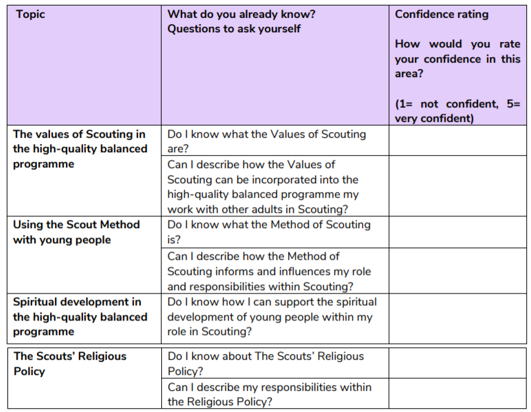
- Course
- One to one
- Small Group
- e-learning
To validate this module, you will need to complete two of the following:
- Show how the Purpose, Values and Methods of Scouting have been incorporated into the programme to meet the needs of youth members of all sections.
Evidence you could use may include one or more of the following: photographs and/or video of
activities at meetings, a sectional visit from your TA, a written or verbal statement to your Training Adviser from an observer summarising your role in this activity, evidence of young people exploring the values within an activity e.g. flip-charts, programme ideas for the section either side of your own. - Deliver an activity to demonstrate the integration of spiritual development of young people within the programme. Provide practical examples of how faiths, beliefs and attitudes were explored.
Evidence you could use may include one or more of the following: photographs and/or video of an activity, a sectional visit from your TA, a written or verbal statement to your Training Adviser from an observer summarising your role in this activity, evidence from young people e.g. surveys, creative work, video clips, quotes, magazine article. - Create a presentation or activity to explain the Religious Policy to either adults new to Scouting or young people.
Evidence you could use may include one or more of the following: a PowerPoint presentation and script, a video of delivery, paper evaluations from learners, a visit from your TA, a written or verbal statement to your Training Adviser from an observer summarising your role in this activity. - Deliver a Scouting event (e.g. camp, Scout’s Own) accessible to people representing different faiths and beliefs.
Evidence you could use may include one or more of the following: a list to demonstrate all the areas which reflect inclusivity, a video to demonstrate how young people have benefitted from attending a multi-faith event, a plan or photographs of a Scout’s Own, a visit from your TA, a written or verbal statement to your Training Adviser from an observer summarising your role in this activity. - Produce an action plan detailing how you would support or have supported another adult in implementing the values of Scouting in their role.
Evidence you could use may include one or more of the following: a written action or development plan, a video or observation of a meeting with another adult as part of supporting them in implementing the values of Scouting in their role.
Any other ideas subject to agreement with your Training Adviser.
Additional validation criteria can be created in consultation with a Training Adviser if necessary. Any additional validation criteria created will need to check what you have learnt and that you can apply the skills you have acquired to your role.
The list of evidence provided for each validation criteria is not exhaustive and there may be other forms of evidence that you may wish to use to validate this module. These can be agreed with your Training Adviser. In addition to looking at the evidence you have provided, your Training Adviser will ask you to review and explain some elements, to ensure that you have applied your knowledge and understanding in your role.
Scouting for All (07)
To promote the policies of The Scouts that encourage inclusion and to consider how the individual, in their role, can help make Scouting accessible to all.
- Diversity and inclusion – The Scouts’ policies
- Diversity and inclusion – your own thoughts
- How you in your role can make Scouting accessible to all
- Social, cultural and religious diversity
Partial Revalidation of this module is required when moving to a manager appointment, in which case learners must complete the manager specific validation criteria in light of their new role.
These questions are designed to help you establish what you already know and the learning you still have left to complete for this module. You should work with your Training Adviser (TA) to identify any learning you have left to complete and how you can complete this. These questions will explore your knowledge on the topics covered; you will need to demonstrate practical experience to meet the requirements of the validation criteria below.
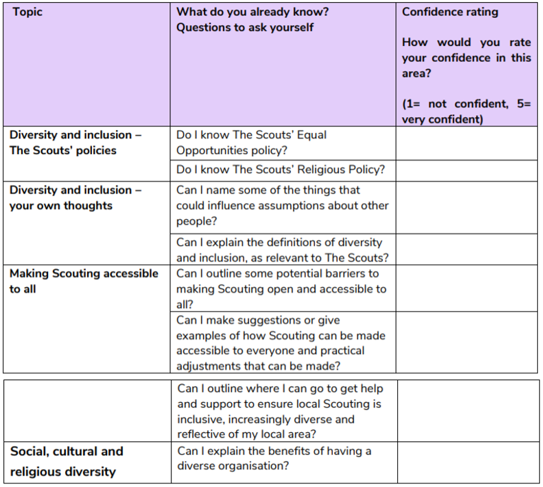
- Course
- One to one
- Small Group
To validate this module, you will need complete one of the following:
Outline the Equal Opportunities Policy and explain how you are making Scouting a diverse and inclusive organisation by showing evidence of how you are making Scouting accessible to one or more of the following:
- those with additional needs
- girls and young women
- those of minority ethnic communities
- those of a variety of religious backgrounds
- those of a variety of socio-economic backgrounds
Evidence you could use may include one or more of the following: a sectional visit from your Training Adviser observing you running an activity or game to increase awareness of additional needs or equal opportunities, A visit from your Training Adviser observing you running a recruitment event that highlights that Scouting is open to all, a written or verbal statement to your Training Adviser from an observer summarising your role in an activity to make Scouting more accessible, videos or photos of you running an activity or game, an article in a magazine/on the internet showing that Scouting is open to all.
Any other ideas subject to agreement with your Training Adviser.
Additional validation criteria can be created in consultation with a Training Adviser if necessary. Any additional validation criteria created will need to check what you have learnt and that you can apply the skills that you have acquired to your role.
The list of evidence provided for each validation criteria is not exhaustive and there may be other forms of evidence that you may wish to use to validate this module. These can be agreed with your Training Adviser. In addition to looking at the evidence, you have provided, your Training Adviser will ask you to review and explain some elements in order to ensure that you have applied your knowledge and understanding in your role.
Administration (11)
To provide information and best practice on how to manage administrative tasks in Scouting.
- Administrative tasks and record keeping
- Member record management and the Data Protection Act/ General Data Protection Regulations (GDPR)
- Financial responsibilities and best practice
- Insurance arrangements
Revalidation of this module is not required for any change of role
These questions are designed to help you establish what you already know and the learning you still have left to complete for this module. You should work with your Training Adviser (TA) to identify any learning you have left to complete and how you can complete this. These questions will explore your knowledge on the topics covered; you will need to demonstrate practical experience to meet the requirements of the validation criteria below.
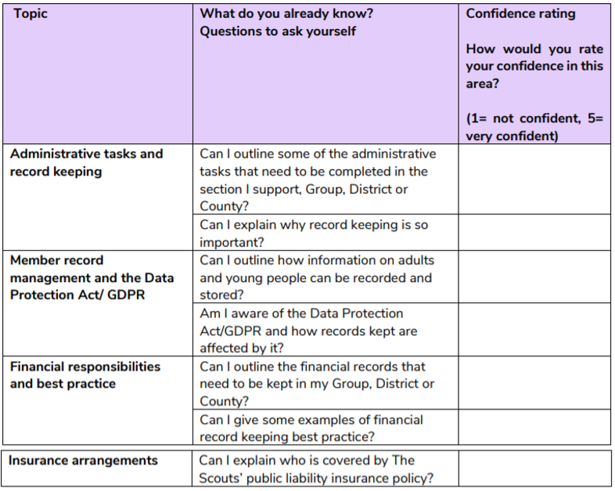
- Course
- One to one
- Small Group
- Workbook
To validate this module, you will need to complete one of the following:
- Demonstrate accurate and appropriate maintenance of administrative and financial records relevant to your role, in accordance with Policy, Organisation and Rules and the Data Protection Act / GDPR.
Evidence you could use may include one or more of the following: written material such as record
books, member records, spreadsheets or databases that demonstrate accurate and appropriate maintenance of administrative and financial records (the exact format of the evidence will depend on the methods used to record necessary data), a written or verbal statement to your Training Adviser by an observer to testify that you maintain accurate administrative and financial records relevant to your role, in accordance with Policy, Organisation and Rules and the General Data Protection Regulations. - Any other ideas subject to agreement with your Training Adviser.
- Additional validation criteria can be created in consultation with a Training Adviser if necessary. Any additional validation criteria created will need to check what you have learnt and that you can apply the skills that you have acquired to your role.
The list of evidence provided for each validation criteria is not exhaustive and there may be other forms of evidence that you may wish to use to validate this module. These can be agreed with your Training Adviser. In addition to looking at the evidence, you have provided, your Training Adviser will ask you to review and explain some elements in order to ensure that you have applied your knowledge and understanding in your role.
First Aid (10)
To cover the skills and knowledge necessary to enable adults to manage an incident and provide basic First Aid.
First Aid
Revalidation of this module is not required for any change of role.
These questions are designed to help you establish what you already know and the learning you still have left to complete for this module. You should work with your Training Adviser (TA) to identify any learning you have left to complete and how you can complete this. These questions will explore your knowledge on the topics covered; you will need to demonstrate practical experience to meet the requirements of the validation criteria below.
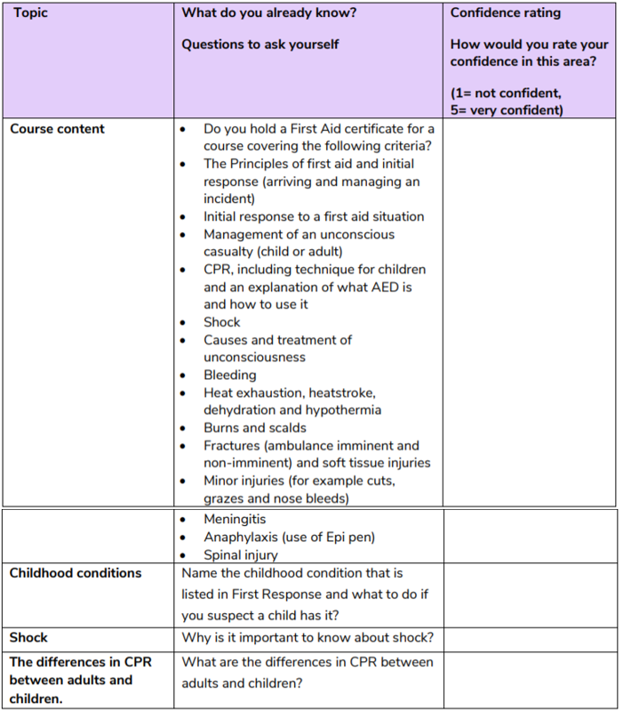
The learning for this module should be completed using one of the following delivery methods:
First Response - The First Response certificate is designed specifically for adults in Scouting, based on the situations and issues that occur within those roles. It is not therefore externally recognised. It can be delivered externally, or by an individual within Scouting who has a full first aid certificate. Further guidance can be found on the members area of our website.
To validate this module, you will need to:
- hold a current First Aid certificate that meets or exceeds the minimum standard of First Response (outlined in the Check Your Knowledge quiz above).
- if a First Aid certificate that does not cover all the minimum criteria of First Response is held, you must demonstrate to your Training Adviser that you have developed the knowledge and practical knowledge to address the additional criteria in a first aid incident.
Programme Planning (12B)
To provide Section Leaders with an opportunity to plan and review a sectional programme including the use of a variety of methods to generate programme ideas.
- How to create an exciting and relevant programme
- How to generate programme ideas
- How to review a programme to enhance it
Revalidation of this module is required for change of section.
These questions are designed to help you establish what you already know and the learning you still have left to complete for this module. You should work with your Training Adviser (TA) to identify any learning you have left to complete and how you can complete this. These questions will explore your knowledge on the topics covered; you will need to demonstrate practical experience to meet the requirements of the validation criteria below.
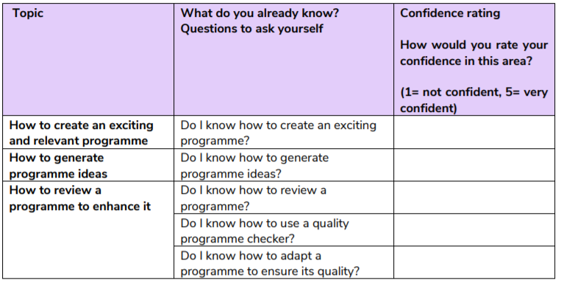
- Course
- One to one
- Small Group
To validate this module, you will need to discuss the Check your Knowledge questions with the Training Adviser, and complete two of the following:
- Produce a Programme Plan (minimum one month) which takes into consideration. You should take into consideration:
- the key themes of the programme
- the underlying themes of the programme
- incorporating a range of programme methods
- how young people are involved in the programme planning process
- whether activities relate to badges and awards
Evidence you could use may include one or more of the following: a visit from your Training Adviser to a programme planning meeting; a verbal or written statement to your Training Adviser from an observer describing a programme planning meeting you have attended; programme plans and programme review documents; discussion with your Training Adviser about taking part in a programme planning meeting, focusing on how you incorporated the elements listed into the programme plan and accompanied by another form of evidence.
- Review your programme and produce evidence for how your review has improved the quality of
future programmes and the programme planning process
Evidence you could use may include one or more of the following: a visit from your Training Adviser observing you completing a programme review; a verbal or written statement to your Training Adviser from an observer describing a programme review you have conducted; programme plans and programme review documents; discussion with your Training Adviser about completing a programme review, focusing on how you improved future programmes using the results of the programme review and accompanied by another form of evidence.
- Any other ideas subject to agreement with your Training Adviser
Additional validation criteria can be created in consultation with a Training Adviser if necessary. Any additional validation criteria created will need to check what you have learnt and that you can apply the skills that you have acquired to your role.
The list of evidence provided for each validation criteria is not exhaustive and there may be other forms of evidence that you may wish to use to validate this module. These can be agreed with your Training Adviser. In addition to looking at the evidence, you have provided, your Training Adviser will ask you to review and explain some elements in order to ensure that you have applied your knowledge and understanding in your role.
Running Safe Activities (17)
To enable adults to plan and run exciting, safe and developmental activities for the young people in their section.
- The importance of activities as a regular part of a high-quality balanced programme
- The processes that need to be followed to carry out any indoor or outdoor activities in Scouting
- Managing groups during the activity, including the Leader in Charge principle
- Planning suitable activities, with appropriate risk assessment and communication
- InTouch system, activity rules, parental permission, and procedures in event of an accident or incident
Revalidation of this module is required when changing from a supporter role to a leader role.
These questions are designed to help you establish what you already know and the learning you still have left to complete for this module. You should work with your Training Adviser (TA) to identify any learning you have left to complete and how you can complete this. These questions will explore your knowledge on the topics covered; you will need to demonstrate practical experience to meet the requirements of the validation criteria below.
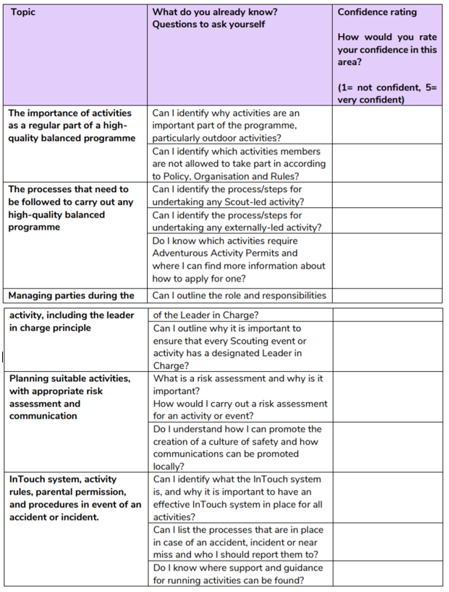
- Course
- One to one
- Small Group
- Workbook
To validate this module, you will need to complete two of the following:
- Plan, or assist in planning, an activity taking into account:
1. The age, experience, fitness and additional needs of the group.
2. The rules related to the activity (including adult to young person ratios; any activity rules; gaining approval from the relevant commissioner; etc.).
3. Any clothing, footwear, personal and group equipment needed for the activity and anticipated weather conditions.
4. The need for a risk assessment to be carried out and communicated effectively.
5. The need for an InTouch system to be in place.
Evidence you could use may include one or more of the following: a visit from your Training Adviser to a programme planning meeting, a written or verbal statement to your Training Adviser from an observer describing your role in planning an activity for the section, programme plans, risk assessments, InTouch procedure documents, registers, and letters to parents or budgets, discussion with your Training Adviser (this should focus on how you incorporated the criteria above when planning an activity for the section and should be accompanied by another form of evidence)
- Act as the leader in charge for an activity, taking into account the need to:
1. Oversee the activity (ensuring that registers, headcounts etc. are in place).
2. Co-ordinate the adults involved in the activity, allocating roles to specific adults and ensuring that they are clear on what they need to do.
3. Communicate relevant instructions, guidance and rules to young people involved in the activity.
4. Carry out a dynamic risk assessment.
Evidence you could use may include one or more of the following: a sectional visit from your Training Adviser to observe you acting as the leader in charge for an activity for the section, a written or verbal statement to your Training Adviser from an observer describing your role in acting as the Leader in Charge for an activity for the section, Programme plans, risk assessments, InTouch procedure documents, registers, letters to parents or budgets, showing the perspective of the Leader in Charge, discussion with your Training Adviser, this should focus on how you incorporated the criteria above acting as the Leader in Charge for an activity and should be accompanied by another form of evidence.
- Any other ideas subject to agreement with your Training Adviser.
Additional validation criteria can be created in consultation with a Training Adviser if necessary. Any additional validation criteria created will need to check what you have learnt and that you can apply the skills that you have acquired to your role.
The list of evidence provided for each validation criteria is not exhaustive and there may be other forms of evidence that you may wish to use to validate this module. These can be agreed with your Training Adviser. In addition to looking at the evidence, you have provided, your Training Adviser will ask you to review and explain some elements in order to ensure that you have applied your knowledge and understanding in your role.
Practical Skills (18)
To encourage adults to gain and develop practical skills for the benefit of the young people in their section.
- Learning practical skills
- Sharing practical skills with young people
Revalidation of this module is required when changing sections or changing from a Supporter role to a
Leader role.
These questions are designed to help you establish what you already know and the learning you still have left to complete for this module. You should work with your Training Adviser to identify any learning you have left to complete and how you can complete this. These questions will explore your knowledge on the topics covered; you will need to demonstrate practical experience to meet the requirements of the validation criteria below.
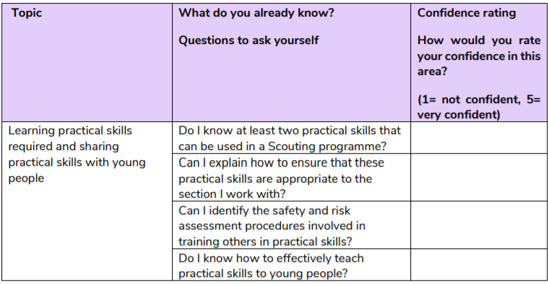
- Course
- Small Group
To validate this module the learner will need to complete two of the following:
- Learn or develop a practical skill which can be used in Scouting
Evidence you could use may include one or more of the following: a visit from your Training Adviser, a written or verbal statement to your Training Adviser from an observer describing you demonstrating a practical skill you have learnt or developed; paperwork such as a qualification in a practical skill, photos or videos of you learning or developing a skill, discussion with your Training Adviser (this will focus on your experience learning or developing a practical skill and should be accompanied by another form of evidence). - Instruct a young person in carrying out two practical skills, ensuring that:
- The skill is appropriate for the section the young person belongs to
- The young person is aware of, and follows, safety and risk assessment procedures.
Evidence you could use may include one or more of the following: a visit from your Training Adviser, a written or verbal statement to your Training Adviser from an observer describing you instructing young people in a practical skill, Programme plans, instructions for carrying out a practical skill, risk assessments for an activity carrying out a practical skill, photos or videos of you instructing a young person in a practical skill, discussion with your Training Adviser (this will focus on your role instructing a young person in a practical skill and should be accompanied by another form of evidence).
- Demonstrate two practical skills, at least one of these skills is one that you have learnt or
developed in your role in Scouting, ensuring that:- The skill is appropriate for the section the young person belongs to
- Safety and risk assessment procedures are followed appropriately.
Evidence you could use may include one or more of the following: a visit from your Training
Adviser, a written or verbal statement to your Training Adviser from an observer describing you demonstrating a practical skill you have learnt or developed, photos or videos of you demonstrating two practical skills, a qualification in a practical skill, programme plans, instructions for carrying out a practical skill, risk assessments for carrying out a practical skill discussion with your Training Adviser (this will focus on you demonstrating a practical skill and should be accompanied by another form of evidence).
- Any other ideas subject to agreement with your Training Adviser.
Additional validation criteria can be created in consultation with a Training Adviser if necessary. Any additional validation criteria created will need to check what you have learnt and that you can apply the skills that you have acquired to your role.
The list of evidence provided for each validation criteria is not exhaustive and there may be other forms of evidence that you may wish to use to validate this module. These can be agreed with your Training Adviser. In addition to looking at the evidence, you have provided, your Training Adviser will ask you to review and explain some elements in order to ensure that you have applied your knowledge and understanding in your role.
Introduction to Residential Experiences (16)
An overview of the role of residential experiences for young people in Scouting, and their organisation and planning.
- The role of residential experiences in the development of young people
- Organisation and administration of residential experiences
- Skills required within a team running a residential experience
- The Nights Away Permit Scheme
- Support and further information for planning a residential experience
Please note that the nights away permit scheme is operated separately from the Adult Training Scheme. You will be required to complete additional training and assessment separately from the completion and validation of this module if you wish to achieve a Nights Away Permit.
Revalidation of this module is only required if the new role contains a substantial increase in responsibility for residential experiences. The revalidation for this module should be discussed with your line manager and Training Adviser to determine whether it is necessary in your new role.
These questions are designed to help you establish what you already know and the learning you still have left to complete for this module. You should work with your Training Adviser (TA) to identify any learning you have left to complete and how you can complete this. These questions will explore your knowledge on the topics covered; you will need to demonstrate practical experience to meet the requirements of the validation criteria below.
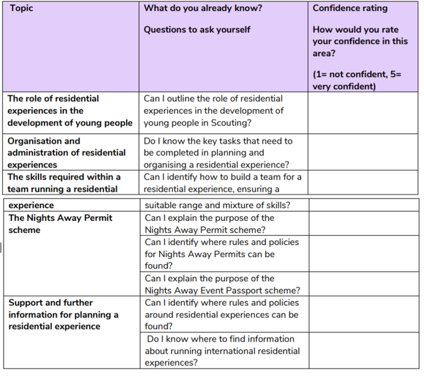
- Course
- One to one
- Small Group
If the learner holds the Nights Away Permit, this will count as validation for this module.
Please note that the Nights Away Permit scheme is operated separately from the Adult Training Scheme. You will be required to complete additional training and assessment separately from the completion and validation of this module if you wish to achieve a Nights Away Permit.
To validate this module, you will need to:
Complete the Residential Experiences Quiz with your Training Adviser
Evidence: The completed Residential Experiences Quiz included with this module. You will then need to reflect on your answers with your Training Adviser.
And complete one of the following:
- Assist with planning and supporting a residential experience and describe or show evidence of how the role that you played in planning and supporting this event addressed two of the following areas:
- The main aspects of organisation and administration
- Selecting a team and the roles undertaken by the team
- Appropriate adult to young person ratios
- Identifying and dealing with potential issues (logistics, behaviour, budget)
- Where additional support and information can be gathered.
Evidence you could use may include one or more of the following: team rotas, letters to parents or contingency planning documents from a residential experience, a visit to a camp briefing by your
Training Adviser, a written or verbal statement to your Training Adviser from an observer describing your role in planning or supporting a residential experience, discussion with your Training Adviser (this should focus on the role that you played in planning or supporting the residential experience and be accompanied by another form of evidence). - Show evidence of how you are promoting and providing opportunities for young people in the section to take part in residential experiences, and describe how these opportunities are benefiting the young people in the section.
Evidence you could use may include one or more of the following: discussion with your Training
Adviser (this should focus on your role in promoting and providing opportunities for residential experiences to the young people in your section and be accompanied by another form of evidence), paperwork produced to promote and provide opportunities for young people in the section, a sectional visit from your Training Adviser, a written or verbal statement to your Training Adviser from an observer describing your role in providing opportunities for residential experiences to young people through assisting with information evenings, or games and activities to support residential experiences.
- Any other ideas subject to agreement with your Training Adviser.
Additional validation criteria can be created in consultation with a Training Adviser if necessary. Any additional validation criteria created will need to check what you have learnt and that you can apply the skills that you have acquired to your role.
The list of evidence provided for each validation criteria is not exhaustive and there may be other forms of evidence that you may wish to use to validate this module. These can be agreed with your Training Adviser. In addition to looking at the evidence, you have provided, your Training Adviser will ask you to review and explain some elements in order to ensure that you have applied your knowledge and understanding in your role.
1. Why do we have a Nights Away Permit scheme?
2. What are the four types of Nights Away Permit available to adults in Scouting?
3. True or False?
- The type of permit available is based on the section an adult volunteers with
- A Section Leader can lead an event for another section if they hold the correct permit
4. What is the maximum possible term for each type of permit?
5. Is a Nights Away Permit needed for each County/Area/Region in which you camp?
6. Family camps are a good way to enthuse parents. Which sections can attend a family camp?
7. What are the specific rules for Beaver Scouts attending a family camp? Where can you find this information?
8. True or false?
- Parents don’t need to have any criminal records checks to attend a family camp
- Parents or supporters will need to have extra insurance to cover them on a family camp
9. How may international residential experiences be organised?
10. Where can you find more information about international residential experiences?
11. What are Nights Away Event Passports and who are they for?
12. True or false?
- Any Permit holder can grant a Nights Away Event Passport
- The Permit Holder who grants the Nights Away Event Passport must attend the event
- The Nights Away Event Passport can only be used by under 18s, but they can be used for multiple
events
International (19)
To provide an international focus appropriate to their section and appreciate the global nature of Scouting.
- The nature of world Scouting
- International events
- International aspects of the high-quality balanced programme
- Benefits of international activities to young people
Revalidation of this module is not required for any change of role.
These questions are designed to help you establish what you already know and the learning you still have left to complete for this module. You should work with your Training Adviser to identify any learning you have left to complete and how you can complete this. These questions will explore your knowledge on the topics covered; you will need to demonstrate practical experience to meet the requirements of the validation criteria below.
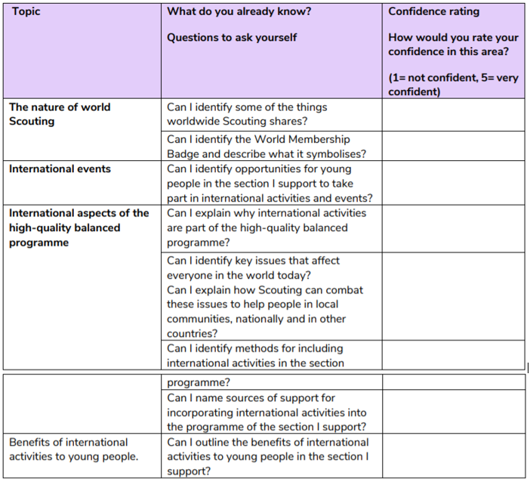
- Course
- One to one
- Small Group
To validate this module, you will need to:
Review the programme for the section you support and adjust ensure it incorporates international activities.
Evidence you could use may include one or more of the following: a visit from your Training Adviser to observe you completing a programme review, a written or verbal statement to your Training Adviser from an observer describing you completing a programme review, programme plans and programme review documents, photos or videos of you conducting a programme review, discussion with your Training Adviser (this should focus on how you completed the programme review and adjustments made and should be accompanied by another form of evidence).
And complete two of the following:
- Plan and run an international themed event or activity for young people exploring either:
- the global nature of Scouting
- the role of the World Membership Badge
- international events in Scouting
Evidence you could use may include one or more of the following: a visit from your Training Adviser to observe you planning and running an activity; a written or verbal statement to your Training Adviser from an observer describing your role in planning and running an activity with the young people in your section, programme plans, instructions for an event or activity with young people, photos of videos of a game or activity you have run, discussion with your Training Adviser (this should focus on your role in running a game or activity for young people and should be accompanied by another form of evidence).
- Be involved in the planning and running of an international trip, for example a camp abroad, including producing an event plan.
Evidence you could use may include one or more of the following: a visit from your Training Adviser to a planning meeting or international trip, a written or verbal statement to your Training Adviser from an observer describing your role in the planning and running of an international trip, letters to parents for the international trip, an event plan, discussion with your Training Adviser, this should focus on your role planning and running an international trip and should be accompanied by another form of evidence.
- Support young people taking part in an international experience
Evidence you could use may include one or more of the following: a visit from your Training Adviser to a planning meeting you are supporting, a sectional visit from your Training Adviser that showcases the support you are providing to young people taking part in an international experience, a written or verbal statement to your Training Adviser from an observer describing your role in providing support to young people attending an international experience, letters and other resources created to support young people on an international experience, discussion with your Training Adviser (this should focus on your role providing support to young people attending an international experience and should be accompanied by another form of evidence).
- Establish or actively maintain a link, and exchange information, with a Scout Group outside the UK.
Evidence you could use may include one or more of the following: a visit from your Training Adviser to a JOTI/JOTA event you are taking part in with a Group outside the UK, a sectional visit from your Training Adviser, Letters between the Groups, Trips to visit the group, Photos of the group, photos, videos or screenshots of JOTI/JOTA contact with your link Group, a written or verbal statement to your Training Adviser from an observer describing your role in running a game, activity or section meeting which supports your link to a Scout Group outside the UK, discussion with your Training Adviser (this should focus on your role in establishing and maintaining a link with a Group outside the UK and should be accompanied by another form of evidence).
- Any other ideas subject to agreement with your Training Adviser.
Additional validation criteria can be created in consultation with a Training Adviser if necessary. An additional validation criteria created will need to check what you have learnt and that you can apply the skills that you have acquired to your role.
The list of evidence provided for each validation criteria is not exhaustive and there may be other forms of evidence that you may wish to use to validate this module. These can be agreed with your Training Adviser. In addition to looking at the evidence, you have provided, your Training Adviser will ask you to review and explain some elements in order to ensure that you have applied your knowledge and understanding in your role.
Supporting Young People (14)
To enable adult volunteers working with young people, to understand and meet their needs.
- Characteristics and development of young people
- External influences on young people
- Creating a supportive environment for young people
- Responding to issues affecting young people
Revalidation of this module is required when changing sections or changing from a Supporter role to a Leader role.
These questions are designed to help you establish what you already know and the learning you still have left to complete for this module. You should work with your Training Adviser (TA) to identify any learning you have left to complete and how you can complete this. These questions will explore your knowledge on the topics covered; you will need to demonstrate practical experience to meet the requirements of the validation criteria below.
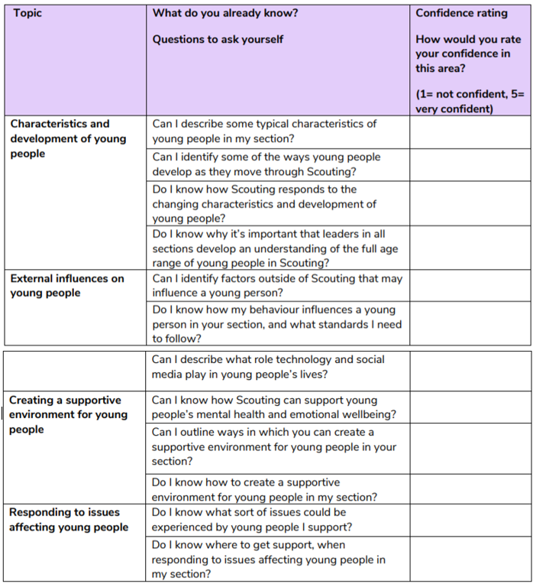
- Course
- One to one
- Small Group
- Workbook
To validate this module, you will need to complete one of the following:
- Outline how your section provides a supportive environment for young people
Evidence you could use may include one or more of the following: discussion with the learner about
specific examples of strategies to create a supportive environment; a written report about specific examples of strategies to create a supportive environment.
- Create an action plan to develop the supportive environment in your section
Evidence you could use may include one or more of the following: discussion with the learner about their action plan including specific examples of steps taken to ensure a supportive environment; a copy of an action plan including specific examples of steps taken to ensure a supportive environment.
- Show evidence of communicating appropriately with young people as part of their role
Evidence you could use may include one or more of the following: observing the learner at a section meeting; verbal or written statement from an observer describing how the learner communicates with young people in the section.
And complete one of the following:
- Show evidence of responding effectively to issues affecting young people in the section
Evidence you could use may include one or more of the following: verbal or written statement from line manager or another adult volunteer in the section about a situation the learner has responded to; discussion with the learner about a situation the learner has responded to.
- Plan and deliver an activity raising awareness of some of the issues experienced by young people
Evidence you could use may include one or more of the following: a sectional visit; notes from a
activity run with the young people from the learner’s section, a verbal or written statement from an observer describing an activity the learner has run with the young people in the section, discussion with the learner, this should focus on a game or activity they have run with the young people in the section and be accompanied by another form of evidence.
- Any other ideas subject to agreement with your Training Adviser.
Additional validation criteria can be created in consultation with a Training Adviser if necessary. Any additional validation criteria created will need to check what you have learnt and that you can apply the skills that you have acquired to your role.
The list of evidence provided for each validation criteria is not exhaustive and there may be other forms of evidence that you may wish to use to validate this module. These can be agreed with your Training Adviser. In addition to looking at the evidence, you have provided, your Training Adviser will ask you to review and explain some elements in order to ensure that you have applied your knowledge and understanding in your role.
Promoting Positive Behaviour (15)
To enable adult volunteers to proactively promote positive behaviour and appropriately manage challenging behaviour in their section.
- Defining challenging behaviour
- Planning for positive behaviour; principles and strategies
- Responding to challenging behaviour
- Additional help and support for challenging behaviour
Revalidation of this module is required when changing sections or changing from a Supporter role to a Leader role.
These questions are designed to help you establish what you already know and the learning you still have left to complete for this module. You should work with your Training Adviser (TA) to identify any learning you have left to complete and how you can complete this. These questions will explore your knowledge on the topics covered; you will need to demonstrate practical experience to meet the requirements of the validation criteria below.
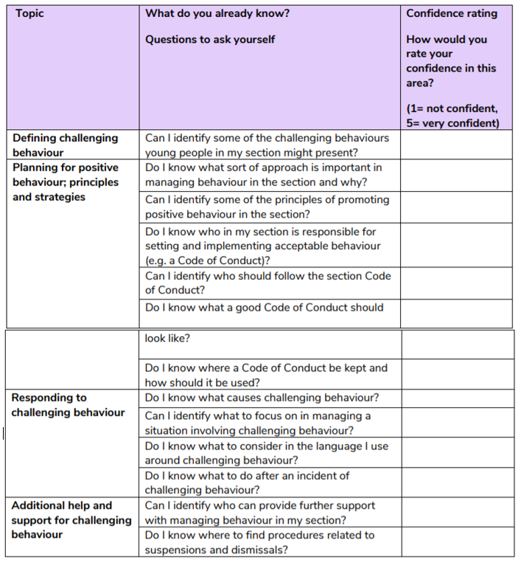
- Course
- One to one
- Small Group
- Workbook
To validate this module, you will need to complete one of the following:
- Work in partnership with young people to develop or review a Code of Conduct for the section.
Evidence you could use may include one or more of the following: copy of the section Code of Conduct; notes from a meeting with the young people in the section to develop/review a section code of conduct; a sectional visit to the learner; a verbal or written statement from an observer describing the learner’s role in developing/reviewing a Code of Conduct.
- Outline strategies used to promote positive behaviour in your section.
Evidence you could use may include one or more of the following: discussion with the learner including specific examples of appropriate strategies; a written report about promoting positive behaviour in the section including specific examples of appropriate strategies.
- Plan and run a game or activity that explores acceptable and unacceptable behaviour with the young people of your section.
Evidence you could use may include one or more of the following: a sectional visit; notes from a game or activity run with the young people from the learner’s section, a verbal or written statement from an observer describing a game or activity the learner has run with the young people in the section, discussion with the learner, this should focus on a game or activity they have run with the young people in the section and be accompanied by another form of evidence.
And also complete one of the following:
- Show evidence of de-escalating an incident of challenging behaviour appropriately
Evidence you could use may include one or more of the following: a verbal or written statement from an observer describing the learner’s role in dealing with an incident of challenging behaviour; discussion with the learner focusing on responding to an incident of challenging behaviour.
- Show evidence of responding effectively following an incident of challenging behaviour; reflecting and reviewing with the adult leadership team, the young person and, where appropriate, the parent.
Evidence you could use may include one or more of the following: an action plan for managing challenging behaviour in the section; notes from a meeting with a parent/carer to discuss a young people’s behaviour and plan support strategies; discussion with the learner focusing on the learner’s role in developing an action plan.
- Any other ideas subject to agreement with your Training Adviser.
Additional validation criteria can be created in consultation with a Training Adviser if necessary. Any additional validation criteria created will need to check what you have learnt and that you can apply the skills that you have acquired to your role.
The list of evidence provided for each validation criteria is not exhaustive and there may be other forms of evidence that you may wish to use to validate this module. These can be agreed with your Training Adviser. In addition to looking at the evidence, you have provided, your Training Adviser will ask you to review and explain some elements in order to ensure that you have applied your knowledge and understanding in your role.
Growing the Section (13)
To cover ways in which an adult volunteering in a section can assist their line manager and others to plan for and contribute to the growth of their section and/or group.
- The importance of growth in Scouting
- Recruitment and retention of young people
- Recruitment and retention of adults
- Tools and support to help develop the sections
Revalidation is required when changing sections or changing from a supporter role to a leader role.
These questions are designed to help you establish what you already know and the learning you still have left to complete for this module. You should work with your Training Adviser (TA) to identify any learning you have left to complete and how you can complete this. These questions will explore your knowledge on the topics covered; you will need to demonstrate practical experience to meet the requirements of the validation criteria below.
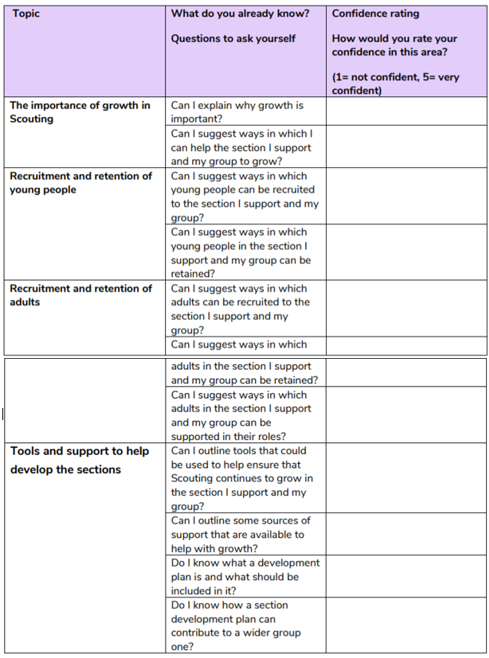
- Course
- One to one
- Small Group
- Workbook
To validate this module, you will need to:
Explain the role that you play in the recruitment and retention of young people and adults and explain why growing Scouting is important; giving examples of new members (adults or young people) who have joined Scouting as a direct result of action you have undertaken, and the steps that you took to enable this to happen.
And complete two of the following:
- Work with others to produce and implement a development plan for your section or group.
Evidence you could use may include one or more of the following: a section or group development plan, a verbal or written statement to your Training Adviser from an observer describing your role in producing a development plan and giving examples of how you are implementing it, discussion with your Training Adviser of producing and implementing a development plan, this should focus on how you implemented the development plan to grow your Section or Group and be accompanied by another form of evidence.
- Run or take part in a recruitment event to help grow your section and group.
Evidence you could use may include one or more of the following: a visit from your Training Adviser to observe a recruitment event to help grow your section or Group, a verbal or written statement to your Training Adviser from an observer describing your role in a recruitment evening, discussion with your Training Adviser of a recruitment evening you have taken part in (this should focus on how your role in the evening and be accompanied by another form of evidence).
- Give examples of how you are being flexible and meeting the needs, wants and time commitments
of adults when recruiting them.
Evidence you could use may include one or more of the following: a visit from your Training Adviser to a meeting with potential new recruits, a verbal or written statement to your Training Adviser from an observer describing your role in meeting with potential new recruits and outlining how you can be flexible to meet their needs, wants and times; discussion with your Training Adviser (this should focus on examples of how you are being flexible and meeting the needs, wants and time commitments of adults when recruiting them and be accompanied by another form of evidence).
- Demonstrate how you have effectively used the transfer methods between sections, your role in
Moving On, Membership Awards and age-range flexibility, giving examples of young people who
you have recently helped to move between sections, reviewing anything you think could be done
better in future.
Evidence you could use may include one or more of the following: a moving on plan for the young people in the section you support, a verbal or written statement to your Training Adviser from an observer describing your role in successfully helping young people to move between sections and giving examples of how this was done, discussion with your Training Adviser (this should focus on your moving on process and highlighting anything you think could be done better in future and be accompanied by another form of evidence).
- Any other ideas subject to agreement with your Training Adviser.
Additional validation criteria can be created in consultation with a Training Adviser if necessary. Any additional validation criteria created will need to check what you have learnt and that you can apply the skills that you have acquired to your role.
The list of evidence provided for each validation criteria is not exhaustive and there may be other forms of evidence that you may wish to use to validate this module. These can be agreed with your Training Adviser. In addition to looking at the evidence, you have provided, your Training Adviser will ask you to review and explain some elements in order to ensure that you have applied your knowledge and understanding in your role.
Skills of Leadership (08)
To introduce models, tools and techniques that will enable adults to be effective leaders of other adults and of young people.
- Systematic planning
- Theory of leadership
- Leadership styles
Revalidation of this module is not required for any change of role. If you have previously held a Manager or Supporter Appointment and have validated ‘Working with People’ you have covered the content for ‘Skills of Leadership’ and will not need to validate this module.
These questions are designed to help you establish what you already know and the learning you still have left to complete for this module. You should work with your Training Adviser (TA) to identify any learning you have left to complete and how you can complete this. These questions will explore your knowledge on the topics covered; you will need to demonstrate practical experience to meet the requirements of the validation criteria below.
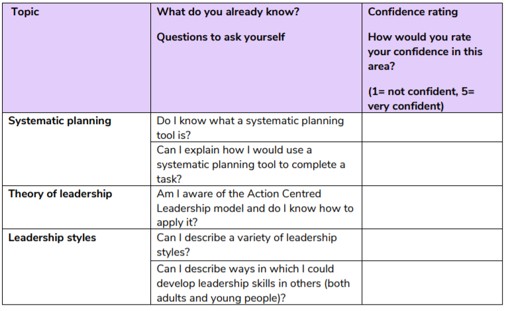
- Course
- One to one
- Small Group
To validate this module, you will need to complete two of the following:
- Use a systematic planning tool to complete a task, provide evidence of your use of the tool and
discuss the experience with your Training Adviser.
Evidence you could use may include one or more of the following: notes on the planning, execution and review of a task using a systematic planning tool, a written or verbal report to your Training Adviser by an observer describing your completion of a task using a systematic planning tool.
- Apply the Action Centred Leadership model to an activity which you have run recently and explain
how it helped you to complete the activity.
Evidence you could use may include one or more of the following: a discussion with your Training
Adviser about an activity you have run recently and how you applied the Action Centred Leadership model to it, a written or verbal report to your Training Adviser by an observer describing the learner applying the action centred leadership model, a written plan for a recent activity showing how the Action Centred Leadership model was applied.
- Using a questionnaire, or similar tool, identify your preferred leadership style, and how it impacts
on your role in Scouting. Reflect on the four different leadership styles and consider how they
inform your working in your section or Group Leadership Team.
Evidence you could use may include one or more of the following: a discussion with your Training
Adviser about the four different leadership styles and their role in your section or Group, a discussion with your Training Adviser exploring how your preferred leadership style impacts on your role in Scouting, a questionnaire highlighting your preferred learning style to be discussed with your Training Adviser alongside other evidence.
- Produce evidence showing how you have led an event or activity during which your leadership
style changed several times.
Evidence you could use may include one or more of the following: a discussion with your Training
Adviser, a written or verbal report to your Training Adviser by an observer about an event or activity where your leadership style changed a number of times, videos showing an event or activity where your leadership style changed a number of times.
- Run a game or activity to develop leadership skills in young people or adults.
Evidence you could use may include one or more of the following: videos or photos of you running a game or activity to develop leadership skills, a visit from your Training Adviser to observe a game or activity to develop leadership skills, a written or verbal report to your Training Adviser by an observer about a game or activity you have led to develop leadership skills.
- Any other ideas subject to agreement with your Training Adviser.
Additional validation criteria can be created in consultation with a Training Adviser if necessary. Any additional validation criteria created will need to check what you have learnt and that you can apply the skills that you have acquired to your role.
The list of evidence provided for each validation criteria is not exhaustive and there may be other forms of evidence that you may wish to use to validate this module. These can be agreed with your Training Adviser. In addition to looking at the evidence, you have provided, your Training Adviser will ask you to review and explain some elements in order to ensure that you have applied your knowledge and understanding in your role.
Working with Adults (09)
To understand the underlying functions required to work effectively as a member of an adult team.
- Effective communication
- Listening skills
- Decision-making structures
- Representing others
Revalidation of this module is not required for any change of role. If you have previously held a Manage or Supporter Appointment and have validated ‘Working with People’ you have covered the content for ‘Working with Adults’ and will not need to validate this module.
These questions are designed to help you establish what you already know and the learning you still have left to complete for this module. You should work with your Training Adviser (TA) to identify any learning you have left to complete and how you can complete this. These questions will explore your knowledge on the topics covered; you will need to demonstrate practical experience to meet the requirements of the validation criteria below.
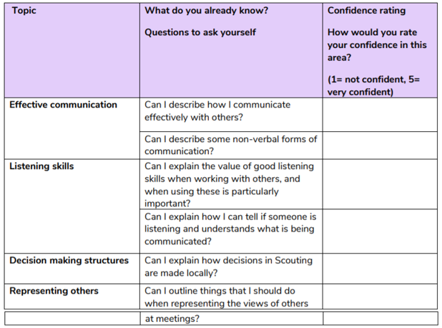
- Course
- Small Group
To validate this module, you will need to complete two of the following:
- Represent others at a Scout meeting and report back on the decisions made and the reasons for them.
Evidence you could use may include one or more of the following: a discussion with your Training
Adviser about how you represented others at a Scout meeting, a visit to a Scout meeting by your Training Adviser, a written or verbal report to your Training Adviser from an observer describing you representing others at a Scout meeting.
- Demonstrate how you have helped someone make decisions (without breaking confidentiality),
including describing the techniques of effective listening and how these were applied.
Evidence you could use may include one or more of the following: a discussion with your Training
Adviser about how you helped someone make decisions (including describing techniques of effective listening and how these were applied), notes from a meeting with a colleague where you have helped them make decisions (without breaking confidentiality).
- Demonstrate your ability to understand different aspects of verbal and non-verbal communication
and implement appropriate responses.
Evidence you could use may include one or more of the following: a discussion with your Training
Adviser about different aspects of verbal and non-verbal communication, a presentation of your own research on different aspects of verbal and non-verbal communication to your Training Adviser or another adult in Scouting.
- Any other ideas subject to agreement with your Training Adviser.
Additional validation criteria can be created in consultation with a Training Adviser if necessary. Any additional validation criteria created will need to check what you have learnt and that you can apply the skills that you have acquired to your role.
The list of evidence provided for each validation criteria is not exhaustive and there may be other forms of evidence that you may wish to use to validate this module. These can be agreed with your Training Adviser. In addition to looking at the evidence, you have provided, your Training Adviser will ask you to review and explain some elements in order to ensure that you have applied your knowledge and understanding in your role.
Skills for Residential Experiences (38)
To provide adults with the appropriate skills to plan and run successful residential experiences for the young people in their section.
- The planning process
- Elements of effective administration
- Choosing and preparing a team
- Choosing, using and maintaining the right equipment
- Practical skills
- Health, happiness and safety issues
- Catering requirements
- Evaluating venues
This module should help to prepare adults in the skills and knowledge needed for the Nights Away
Permit Scheme.
Please note that the Nights Away Permit scheme is operated separately from the Adult Training
Scheme. You will be required to complete additional training and assessment separately from the
completion and validation of this module if you wish to achieve a Nights Away Permit.
Revalidation of this module is only required if the new role contains a substantial increase in responsibility for residential experiences. The revalidation for this module should be discussed with your line manager and Training Adviser to determine whether it is necessary in your new role.
These questions are designed to help you establish what you already know and the learning you still have left to complete for this module. You should work with your Training Adviser to identify any learning you have left to complete and how you can complete this. These questions will explore your knowledge on the topics covered; you will need to demonstrate practical experience to meet the requirements of the validation criteria below.
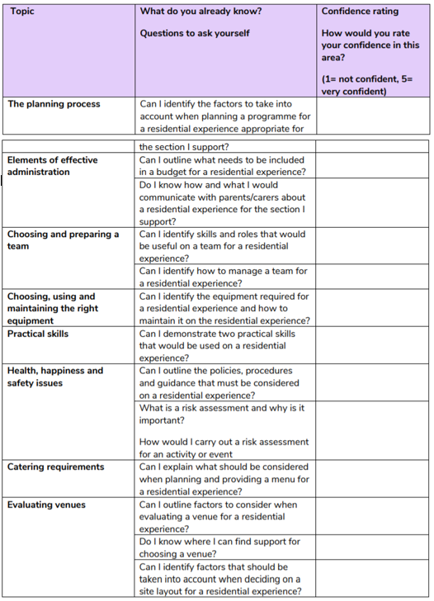
- Course
- One to one
- Small Group
If the learner holds the Nights Away Permit, this will count as validation for this module.
To validate this module, you will need to complete and provide evidence of one of the following activities from each group:
Group 1: planning and event administration
- Carry out a pre-camp visit; record and demonstrate your findings to select appropriate sites for different types of residential experience.
- Show evidence of how the InTouch procedure and nights away information form have been used for a camp or residential experience.
- Carry out a risk assessment on a venue for a residential experience, provide evidence and explain how and why risk assessments should be undertaken both before and during residential experiences.
- Identify, select and justify appropriate group and personal equipment for at least two different styles of residential experience, for example a kit list, a group equipment list.
- Plan a suitable balanced menu for a camp or residential experience, take into account any specific dietary needs and identify the items and quantities required within an agreed budget.
Group 2: using practical skills
- Demonstrate at least two different cooking methods for use on camps and residential experiences (for example open fires, gas and pressure stoves, hay box, camp oven, etc).
- Show how to pitch and strike at least two types of tent (for example patrol, dome, tunnel, hike, marquee, frame tent) and explain how to care for and maintain them.
- Demonstrate the safe use of saws and axes. State the safety rules for their use, storage and transportation.
- Set up an indoor venue in preparation of young people arriving for a residential experience, and explain your choice of room use, sleeping arrangements and safety considerations for any outdoor areas.
- Demonstrate or explain tactics for dealing with homesickness in younger children.
Group 3: planning a programme
- Plan a programme for a residential experience for the section you support, taking into consideration:
- a high-quality balanced programme
- contingency plans
- appropriateness of the programme for the section
- the role of residential experiences in the section programme and the development of young people.
- Identify, plan and run opportunities for spiritual reflection at a camp or residential experience
- Any other ideas subject to agreement with your Training Adviser.
Additional validation criteria can be created in consultation with a Training Adviser if necessary. Any additional validation criteria created will need to check what you have learnt and that you can apply the skills that you have acquired to your role.
The list of evidence provided for each validation criteria is not exhaustive and there may be other forms of evidence that you may wish to use to validate this module. These can be agreed with your Training Adviser. In addition to looking at the evidence, you have provided, your Training Adviser will ask you to review and explain some elements in order to ensure that you have applied your knowledge and understanding in your role.
Mentoring and Coaching (39)
To provide the skills, knowledge and attitudes necessary to effectively mentor and coach both adults and young people in Scouting Roles.
- Learning Styles
- Motivation
- Emotional Intelligence and Resilience
- Communication
- The GROW Model
- Giving Feedback
Revalidation of this module is not required for any change of role.
- Course
- One to one
- Small group
A ‘formal evidence portfolio’ is not required to validate as a Mentor or Coach. However documentary evidence will be required to show that the validation criterion has been achieved.
Example of this evidence may include:
- discuss the training content and objectives of the Pre-Course Learning with a Training Adviser
- complete a Mentoring and Coaching ‘How are we going to work together?’ with an adult you are supporting
- meet with an adult you are supporting for a minimum of two sessions
- effectively apply the TSA Mentoring and Coaching Approach with an adult you are supporting
- effectively apply the Grow module with an adult you are supporting
- complete a personal reflection log for a period of 3 months
- any other ideas, subject to agreement with a Training Adviser
Notes
As coaching and mentoring sessions should be confidential, observation of these is not appropriate for validation purposes.
APPENDIX 1: Useful Resources
The Support Centre is your first point of contact for The Scouts. You can ask questions and receive advice. The Support Centre is open from 9am – 5pm weekdays and can be contacted by:
Live chat: Click the purple 'help' button bottom right of the page.
Phone: 0345 300 1818 (local rate) or 0208 433 7100
Email: support@scouts.org.uk
Outlines The Scouts’ approach to adult training, the details of the training scheme and the local management of training provision. Also includes information on the minimum module requirements for the different roles in The Scouts. Find out more about the Adult Training Scheme.
The Supplementary Module Pages will be useful for members who choose to undertake any of the supplementary modules. These can be printed and inserted into the Adult’s Personal File or referred to online. The Supplementary Module pages for the Adult’s Personal File can be accessed in one document with all the Supplementary Modules.
There are a huge number of resources available online in the Members area of scouts.org.uk to support you in completing your training and in your role itself. For resources to help you with your training, a good place to start is the learners’ area which provides information on relevant resources and guidance for each module. Read more about the Learner's resources.